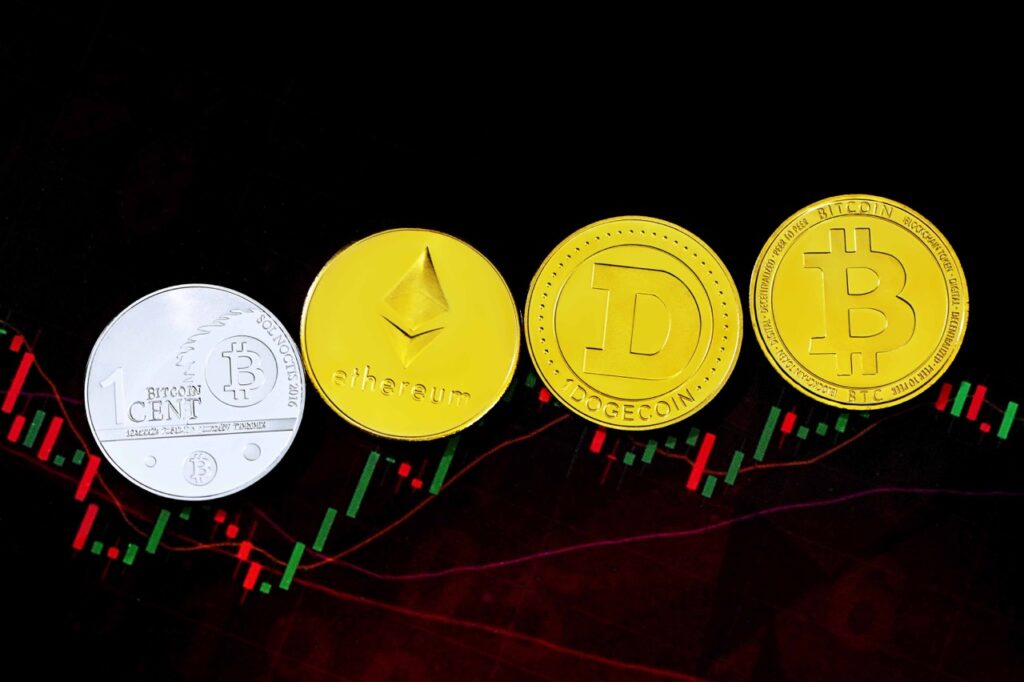Bitcoin vs Ethereum: What’s the Better Long Term Investment?
Table of Contents
With the cryptocurrency market booming, more investors than ever are looking to invest in the space. Two of the most popular digital assets include Bitcoin and Ethereum. But which is a better long term investment?
In this article, we will cover the differences between the two and examine why you may choose one over the other.

Bitcoin Vs Ethereum
Definition of Bitcoin and Ethereum
Bitcoin and Ethereum are two highly popular cryptocurrencies which were created to enable users to perform secure, transparent and immutable transactions. Both have seen widespread adoption in the past decade. Bitcoin was first created in 2009 as an open source project while Ethereum was launched in 2015.
In the simplest terms, Bitcoin is a digital currency that can be used to facilitate online payments and store value. It was designed to make financial transactions more efficient, secure and cost-effective by using decentralized technology.
It is powered by a peer-to-peer network of computers all over the world, and it has no central authority or government control, giving it immunity from external interference or manipulation.

On the other hand, Ethereum is a decentralized platform that runs smart contracts: applications that run exactly as programmed without any possibility of downtime, censorship, fraud or third-party interference.
The Ethereum blockchain stores information about its transaction history and the applications running on it – those are built on top of cryptographic foundations – thus providing users with an immutable ledger which cannot be altered or tampered with.
Like Bitcoin, it can also be used to facilitate financial transactions but its main purpose is executing contracts automatically once certain conditions have been met – this makes Ether (or ETH) a great tool for developers building distributed applications (dApps).

Comparison of Bitcoin and Ethereum
Bitcoin and Ethereum are both popular cryptocurrencies that have been in circulation since 2009 and 2015 respectively. Both of these currencies are decentralized virtual applications, commonly referred to as “programmable money”. This means that they have the same basic code structure and use the same technology, but operate on different platforms and are mutually exclusive.
Bitcoin is a digital currency that enables users to buy goods or services online without needing any form of exchange or bank accounts. It operates on a decentralized consensus system, meaning that all transactions must be validated by users before it can be added to the blockchain. The main purpose of Bitcoin is for it to become a global digital currency for everyone, not just for tech-savvy individuals.

Ethereum operates on an open-source blockchain platform that features smart contracts functionality.
It is an application development platform based on distributed ledger technologies with its cryptocurrency, Ether, as its internal currency unit. Ethereum allows developers the freedom to build reliable decentralized applications which can interact with each other without the need for a third party or intermediary.
These applications are run by thousands of computers across numerous countries, providing a secure and unhackable environment for data storage, processing and communication through blockchain technology.
In addition, Ether acts as an internal means of payment over the Ethereum network thus powering operations in many different industries such as banking and finance, health care and logistics among others.

Advantages of Bitcoin
Bitcoin is the first and largest cryptocurrency in the world, and many investors see the potential of this emerging asset class. Bitcoin has a number of advantages over other cryptocurrencies, making it an attractive option for long-term investors.
This section will explore the advantages of Bitcoin over Ethereum and other altcoins, and provide investors with an informed analysis of which coin is the better long-term investment.

Low transaction fees
One of the key advantages of using Bitcoin for transactions is that the fees associated with these transactions are incredibly low. In comparison to traditional methods such as a wire transfer or credit card, Bitcoin transaction fees are generally much lower.
This low fee allows users to pay for goods and services at a lower cost than would otherwise be possible with traditional payment methods. Additionally, because cryptocurrency transactions are secure, this helps protect users from fraud and gives merchants more confidence in accepting payments from customers worldwide.
In addition to the low transaction fees, Bitcoin also offers secure and fast transfers anywhere in the world. Customers can transfer funds directly from their wallet to any other quickly and easily with no risk of credit card hacking or fraud.

Additionally, crypto exchanges have implemented additional measures such as KYC (know your customer) verification and other security regulations, making crypto transfers even more secure than before.
Finally, many online businesses prefer Bitcoin because it allows them to accept payments from customers around the world while avoiding high exchange rate fluctuations that come with different currencies.
Not only does this help businesses save money on transaction costs and exchange rates; it also provides an easy way for international customers to purchase products without having to worry about paying hefty foreign exchange fees or worrying about fluctuating exchange rates.

High liquidity
One of the greatest benefits of Bitcoin is that it has high liquidity, which is a key factor when deciding upon an investment. The cryptocurrency markets are highly volatile, yet very liquid in nature. This means that investors can buy or sell Bitcoin quickly and without waiting for long periods of time or relying on centralized exchanges.
Additionally, because the network is open and decentralized, anyone with internet access can send and receive payments regardless of geographical location or banks. This also allows users to directly trade Bitcoin with each other without having to pay fees associated with traditional payment systems. As a result, the demand for Bitcoin is likely to remain strong due to high liquidity and low entry barriers, making it a reliable long-term investment.
Decentralized
One of the most attractive features of Bitcoin is its decentralized nature, as this means it is not controlled by any one authority or individual. The cryptocurrency is stored and maintained using a public ledger called the blockchain, which works in a distributed manner to ensure that the network remains secure. This means that no single person can manipulate or control Bitcoin, which has led to its massive global success.
Decentralization also allows users to remain anonymous when using Bitcoin and provides greater security against potential cyber attacks. Additionally, there are no transaction fees associated with Bitcoin as opposed to other forms of payment processing systems like credit cards, making it an attractive alternative for merchants who wish to accept payments from customers quickly and securely without incurring costs.

Advantages of Ethereum
Ethereum is highly popular in the field of cryptocurrency and blockchain technology. Ethereum is a decentralized platform built on an open source blockchain that allows developers and coders to create automated contracts and decentralized applications.
Ethereum has several advantages over Bitcoin, including its greater scalability, faster transaction speed, and increased energy efficiency. Let’s take a deeper look at the advantages of Ethereum:
Smart contracts
One of the advantages of Ethereum is its use of smart contracts. With Ethereum, transactions on the network can be “self-executing” and executable by computers, with no manual involvement. This type of system has huge potential for use in a wide range of industries and applications, from banking to supply chain management.
Smart contracts are agreements that are automatically enforced based off a set of predetermined criteria. For example, it could be used to execute an exchange between two parties, like an insurance company and claimant, without the need for a third party or middleman to verify or manage the transaction. Ethereum’s technology makes this possible through automation and ensures transparency in any transaction, creating trustless and secure environments for users.

Other applications include:
- Automated insurance settlements
- Self-enforcing agreements such as wills or trusts without any legal intervention (and without voiding warranties by tampering with outside systems)
- Peer-to-peer lending networks running on top of blockchain technology
- Automated stock trading using algorithms stored on Ethereum nodes instead of traditional exchanges
The benefits are clear:
- Fewer resources needed to complete complex processes
- Faster processes by leveraging automation
- Lower costs due to streamlined processes
- Stronger security than before
- Greater trust between participants through predictable transactions
- Higher speed transactions due to near instantaneous execution
- Higher accuracy since errors are eliminated from manual input
- Tamper resistant systems since the code is immutable once deployed
- Increased flexibility in terms since each event can define its own set of predefined parameters and rules
- Safer communication since all exchanged data is encrypted against malicious users or actors (e.g., hackers)
- Audit trails provided on demand so activity can be tracked accurately historically before being made public as well as current activity such as payment updates being recorded cryptographically for clarity/transparency during disputes
- Among other advantages.

High scalability
One of the biggest advantages of Ethereum is its high scalability, which allows it to process a larger number of transactions per second than Bitcoin. This is because Ethereum utilizes the concept of Smart Contracts, which are special agreements that exist between two or more parties on the blockchain and can be coded to automatically execute when specific conditions are met. This makes Ethereum transactions much faster and more efficient than traditional blockchain-based networks.
Furthermore, Ethereum’s Proof-of-Stake consensus algorithm also plays a large role in providing users with security and scalability while reducing transaction fees and improving network throughput. As a result, it has become widely adopted by businesses looking for a secure platform for their digital assets.
Programmable money
One of the key aspects that sets Ethereum apart is that it is programmed in a way that enables certain types of smart contracts and decentralized applications (dApps) to run on its blockchain. Through its use of smart contracts, Ethereum allows users to control their funds without granting access, ensuring that users’ money is secure against any potential theft or loss.
Smart contracts offer users the ability to automate transactions and dictate how funds are stored and transferred. This greatly reduces the need for legal paperwork and formal procedures when dealing with payments or transferring assets from one party to another. This can be extremely useful for exchanging assets such as stocks or real estate properties in a fast, secure, and cost-effective manner.
Furthermore, Ethereum’s development community is active and constantly working on finding solutions for any issues related to scalability, privacy or security. These improvements are implemented in their software each week which keeps the network reliable and safer than ever before. As such, Ethereum can be used for financial transactions as well as providing infrastructure solutions such as digital identity systems at scale – all without third party intervention or censorship risk.

Disadvantages of Bitcoin
Bitcoin has been the most popular cryptocurrency for quite some time, but recently Ethereum has been making some waves. As more and more people invest in cryptocurrencies, it is important to know the differences between Bitcoin and Ethereum.
For starters, let’s take a look at the disadvantages of Bitcoin. In this section we will take a closer look at the risks and disadvantages associated with investing in Bitcoin.
Volatility
One of the most obvious disadvantages of Bitcoin is its extreme volatility. Over the past several years, Bitcoin has been subject to intense market fluctuations which have made it difficult for investors to accurately predict price movements. This means that Bitcoin investments can be seen as a high-risk gambling activity; investors should understand their own risk tolerance levels and proceed accordingly.
Another downside to investing in Bitcoin is the potential for security breaches and manipulation by malicious actors due to its transparent ledger system. For example, if someone discovers a vulnerability in the code behind Bitcoin, they could easily take advantage of this vulnerability and steal money from unsuspecting users. This type of attack has happened before and could happen again in the future which makes investing in it quite risky at times.
Additionally, due to its decentralized structure, there is no central figure or financial institution that regulates or oversees Bitcoin like traditional currencies do. This lack of oversight means that prices are subject to wild swings from both individual and institutional investors which can further increase volatility levels and make it difficult for long-term investments in Bitcoin.
Lastly, due to increasingly stringent taxation regulations imposed on digital currency transactions, it may become more difficult for users to invest or transact with Bitcoin as time goes on without incurring hefty taxes or fees associated with them.

Slow transaction times
One of the major drawbacks of Bitcoin is its slow transaction times. The average time it takes for a Bitcoin transfer to be confirmed is approximately 10 minutes – considerably higher than other digital currencies such as Ethereum and Litecoin, which can be confirmed much faster.
This is because Bitcoin processes transactions one-by-one, instead of multiple transactions at once like other digital currencies. Additionally, the more people are attempting to send Bitcoin at one time, the longer it will take for transactions to process. This issue can make using Bitcoin less practical for merchants that work with a high volume of customers in a shorter amount of time.

Lack of privacy
One of the major disadvantages of using the Bitcoin blockchain is that it lacks privacy relative to other digital currency platforms. Bitcoin is an open ledger system, which means that anyone can view a transactor’s entire wallet balance and transaction history by simply knowing their address. This lack of privacy makes it difficult for individuals to protect their finances from external parties without taking additional measures such as investments into other types of more privacy-oriented cryptocurrencies like Monero, Zcash, or Ethereum’s Ether.
While Bitcoin does offer some degree of anonymity due to its decentralized nature, the details of any given transaction are still relatively public information. Also, sending and receiving addresses are exposed in the blockchain and remain immutable even if a user is able to change their displaying address in a bitcoin wallet interface. Moreover, researchers have been able to track user identities through these historical transactions and link them with real-world identities through publicly available information. As a result, some users prefer more private forms of digital currency such as those provided by Ethereum or Monero’s leading cryptocurrency “XMR” token.

Disadvantages of Ethereum
Ethereum is not without its drawbacks, and these should be taken into consideration before deciding whether or not to invest. Ethereum has suffered from scalability issues, meaning that transaction processing is slow and there are high transaction costs on the network. Ethereum also has some security issues, as there have been cases of theft from smart contracts. The decentralized nature of Ethereum means that it is difficult to regulate and secure as well.
These are all important factors to consider when deciding which cryptocurrency is the better long-term investment:
- Scalability issues
- High transaction costs
- Security issues
- Difficult to regulate and secure
High transaction fees
One of the biggest disadvantages of Ethereum – at least compared to Bitcoin – is that transaction fees are significantly higher. This is due to the fact that Ethereum uses a consensus-based system instead of race-based mining, which requires much more computing power and electricity. Transactions on the Ethereum network take longer to process and cost more than Bitcoin because more computational resources are needed to verify them.
Furthermore, fees for each transaction must be paid in the form of a ‘gas limit’: an integral component of the blockchain technology used by Ethereum. This gas limit ensures that only valid transactions are processed, protecting users from malicious activities such as double spending or accidental mix ups with finances. It’s important to remember when investing in cryptocurrencies that these high transaction fees could affect your return on investment in the long run as each transfer will cost money. Additionally, if you’re looking for quick transactions then Ethereum may not be right for you, since transactions tend to take a bit longer than those with Bitcoin due to its densely packed blockchain network.

Low liquidity
One of Ethereum’s most noticeable disadvantages is the low liquidity for its coins and tokens. Liquidity is the ability to exchange an asset for cash without affecting its market value. Low liquidity assets are difficult to trade and are usually associated with higher risk investments.
Furthermore, Ethereum’s tokens and coins can be affected by market volatility while they wait to be exchanged. A sharp decline in their value could potentially cause significant losses if the asset needs to be sold quickly.
Ethereum’s low liquidity has been a major concern for some investors as it makes it difficult to exit a position in a timely and profitable manner. Additionally, it could limit Ethereum usage as a method of payment due to potential buyers having limited access to currency markets, making it hard for them to acquire ETH tokens quickly or easily.
Security issues
Though Ethereum provides many advantages for users, it is not immune to security issues. The most significant security issue with Ethereum is called a 51 percent attack. A 51 percent attack occurs when one miner or group of miners control more than half of the hashpower, or computing power that runs the blockchain network. If they controlling this majority gain control of all of the blocks on the chain, they can manipulate transactions and double spend coins. This means that they are able to buy Ethereum and spend them twice, and can reverse confirms transactions to gain more coins by using their control of the network hashpower.
Ethereum investors need to be aware of this potential security risk when considering whether it is wise to invest in it long term. Additionally, wallet hacking has become a major issue in recent years due to the lack of secure wallets available for storing cryptocurrency securely on desktop computers and mobile devices such as smartphones or tablets. Be sure to only use reputable wallets recommended by trusted sources such as Coinbase or other secure wallet providers.

Bitcoin vs Ethereum: Which to Choose?
When it comes to investment, the best bet is to diversify your risk. Both Bitcoin and Ethereum offer speculation and potential growth, allowing you to diversify your investments in the market. It’s important to remember that any investment carries some level of risk, and no one can predict what direction the prices of either cryptocurrency will move over time.
For those looking for long-term investment opportunities, both Bitcoin and Ethereum offer a suitable choice.
Taking a close look at these two major players in the cryptocurrency world will help ensure that you make an informed decision when it comes time to deciding on where your money should go:
- Investing in Bitcoin
- Investing in Ethereum
- Investing in both
It is a smart move for the rational investor who has done their research and understands potential risks involved with any long-term investment.
Frequently Asked Questions
The main difference between Bitcoin and Ethereum is that Bitcoin is a digital currency, while Ethereum is a digital platform that can be used to create digital contracts, applications, and other services.
Ethereum offers more scalability and flexibility than Bitcoin. Additionally, Ethereum has more potential applications due to its ability to create digital contracts and applications. This opens up many opportunities for investors to benefit from the technology.
It is difficult to say which is the better long term investment, as both have the potential to be lucrative investments. Ultimately, the decision should depend on an individual’s financial goals and risk tolerance.




